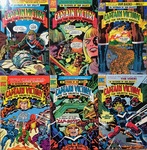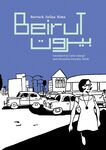
edited by Art Spiegelman and Francois Mouly If the amazing kids' comics from the halycon days of yore are your thing, then you've hit the jackopot with this one! Well over 300 pages of classics, all scanned from the original comics themselves, and printed at approximately 120% of the originals. These scans have been digitally cleaned up a bit, so there's no newsprint background tones, just the flat white paper that they're printed on. While this might upset some purists, it was probably a good call as this book is clearly going to be marketed as a gift for children as well as for older fans, and lay people will have difficulty appreciating the nuances of newsprint; and they did a more than decent job of balancing the tones. The book is, somewhat arbitrarily, divided into five sections: Hey, Kids; Funny Animals; Fantasyland; Storytime; and Weird and Wacky. The book successfully draws across the spectrum of children's comics from the twenty years following the close of the second world war – the golden age of kids' comics that fed the baby boomers' imaginations before television took over. While certainly no one is going to agree with every choice, the editors – along with the board of advisors – picked a good crop of comics that is certain to contain favorites of every fan as well as win the hearts of every reader and, more importantly, is sure to capture the imagination of the next generation. Includes work by all-time greats Carl Barks, Basil Wolverton, Harvey Kurtzman, John Stanley, Bob Bolling, Walt Kelly, and many, many more (even Dr. Seuss, who started out in comics). Get a sneak peek, here (just click on the image of the open book at the top right, under "Sample Toon Treasury").
FROM THE ARCHIVES
ONE NEW BUT SHELF WORN COPY

edited, compiled and annotated by Richard L Graham Government Issue Comics provides readers with a 300 page overview of over sixty years of government sponsored comics. The numerous and various branches of the US government managed, unsurprisingly, to recruit some of the top comics talent of its time, and in these pages you will find work by Will Eisner, Milton Caniff, Al Capp, Joe Kubert and Kurt Schaffenberger – and Charles Schulz, Walt Kelly, Chic Young and George McManus (and Al Wiseman!), along with a host of anonymous unknowns, all working on behalf of educating their fellow citizens on a (very) wide array of issues. Richard Graham, an associate professor and media services librarian at the University of Nebraska has put together a broad survey of this massive but under-appreciated aspect of comics history. It is organized into four categories: military; economics and employment; civil defense, safety and health; and landscapes and lifestyles. Each of these sections begins with an introductory essay by Graham that puts the comics in context. Readers with Q-Code readers will, in theory, be able to access a large online archive of these comics by scanning the digital access code at the end of the book (or, go here and download PDF files of some of the complete comics and start reading now; just scroll down...). Yes, history can be fun! And now for less, as it is now on sale!










